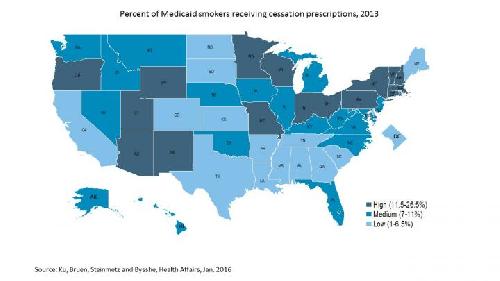When government pays for your health care, they get the right to tell you what behavior can be detrimental to your health - but before that they will pay for medication to help them stop smoking.
But only 10 percent are doing so. Why?
Smoking is the leading cause of preventable disease in the United States and it puts a particularly heavy burden on Medicaid. One-third of US adults with Medicaid coverage currently smoke, a rate that is roughly twice as high as that for the general public.
10 percent is about the effectiveness of smoking cessation techniques but clearly if Medicaid were doing more to get smokers to quit, they would want to do that. So the low uptake of programs to quit smoking may be simply that Medicaid is not more successful because people don't want to quit.

The Affordable Care Act required that all state Medicaid programs cover at least some counseling and FDA-approved therapies like nicotine gum and drugs like bupropion and varenicline. Yet this study found that some states were doing a better job than others at getting Medicaid smokers the help they need.
This study found that the utilization of anti-smoking drugs varied widely from a high of about 30 percent of Medicaid smokers in Minnesota to less than 1 percent in Texas. This study found that the top five states providing Medicaid smokers with anti-smoking medication in 2013 were: Minnesota, New Hampshire, Utah, Oregon and Arizona. The bottom five states that made it hard for smokers to get this therapy in 2013were: Texas, Rhode Island, Kansas, Mississippi and Arkansas.
"Data from the Centers for Disease Control and Prevention suggests that medical treatments for smoking-related diseases will cost the Medicaid program about $75 billion in 2016 but we spend less than one-quarter of one percent of that amount to help smokers quit," said Leighton Ku, PhD, MPH, professor
at Milken Institute School of Public Health (Milken Institute SPH) at the George Washington University
and the lead author of the study. "Every state Medicaid program, working with public health departments and others, could make smoking cessation a higher priority to improve health and to lower health care costs."




Comments